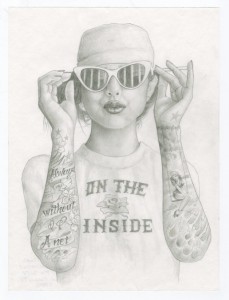I spoke with Elizabeth Rucker, the current Program Coordinator for the Democracy Center — a community center in Cambridge — a broadly-engaged activist, and since 2013, a participant in the Boston chapter of the prison abolitionist organization Black & Pink. Black & Pink asserts that a critical factor in the success of the prison abolition movement is forming meaningful relationships with incarcerated individuals, and LGBTQ prisoners are among the most vulnerable of the incarcerated. B&P finds “free world” pen-pals for LGBTQ-identified and HIV+ prisoners, helps create and distribute newsletters and zines written by and for those prisoners, and has recently facilitated the largest ever survey of LGBTQ prisoners in the US, which is detailed in the report “Coming Out of Concrete Closets.” http://www.blackandpink.org/survey/
Due to her busy schedule (and my personal interest in getting involved), Elizabeth and I arranged to meet-up at a Black & Pink letter-writing session. From a content standpoint I thought this would be interesting, but from an audio-recording standpoint it did turn out to be a little challenging.
Some things that struck me from this interview:
When I asked Elizabeth about victories of the B&P project, she said, “its victory is in its growth,” noting that growing the movement incrementally has been a victory in itself.
“People who are doing criminal justice reform have to become abolitionists. Prison is a system of racial control and always will be.” This was Elizabeth’s response to the question about what needs to happen in order to realize her speculative NY Times headline, and I think it might be the single most powerful statement from the interview.
“Prison is where we put all the problems that we don’t want to deal with.” This is an interesting moment where Elizabeth briefly speaks on intersections of food justice, environmental justice, sexual assault and prison abolition. The failures of the criminal justice system are many and overlapping.
Listen to the interview on Soundcloud here.
NYT Remix here.
